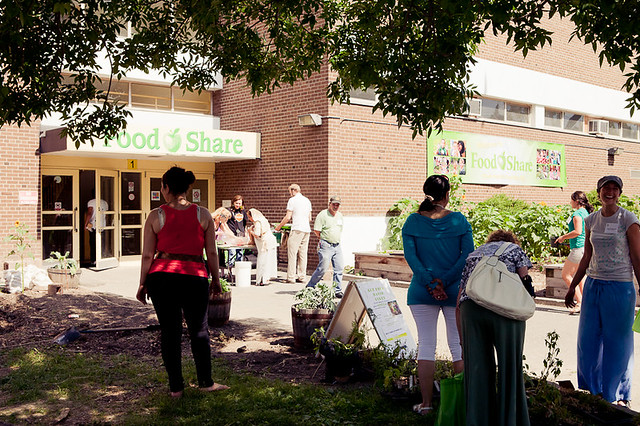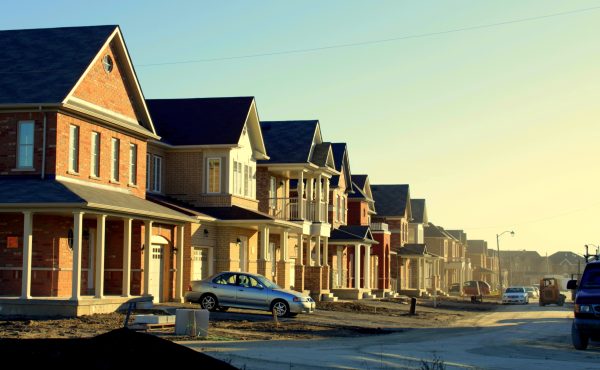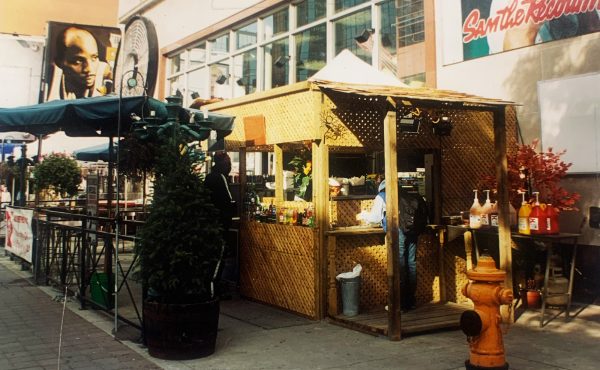
This regular online series will feature interviews with fascinating and influential urban thinkers, with a focus on discussing how Toronto can become a more engaged, accessible, and sustainable city.
To coincide with the release of our latest issue on food in the city, Spacing has conducted a series of interviews with local “Foodfighters” — individuals who are changing the way city-dwellers think about how food is produced and consumed. First in our series is Debbie Field, the executive director of Canada’s largest community food-security organization — Foodshare. Founded 26 years ago to address a series of problems in our local food system, including hunger and a lack of agricultural sustainability, Foodshare now reaches over 100,000 people in Toronto through its network of healthy food distribution, student nutrition, community gardening, and classroom curriculum support programs.
Spacing: What is the rationale behind Foodshare?
Field: Foodshare was founded to address the fact that dominant, capitalist food system in Canada is literally killing us. For low-income people it’s a matter of access to healthy food but the actual problems are almost identical for everyone because we put food last rather than first in social planning and also in our daily lives. Foodshare is working towards getting people to change their relationship to food by asking questions like “how do we each choose to buy food, where do we buy it, how do we choose to eat it, etc…
Each of us needs to be more engaged around some basic principles of food. For instance, we should all be thinking about where our food comes from in terms of local, seasonal, organic and fair trade. At a community level, this may mean shopping at a farmers market, buying a good food box or getting involved in a community-shared agriculture project. On a more basic level, it means asking questions like, “Am I eating 10 servings of fruits and vegetables a day?” and “Am I choosing to eat more home cooked meals with my family and friends?” At the highest level, this means advocating for the creation of a Ministry of Food Security and a National Child Nutrition program. Foodshare is also encouraging subsidization of basic food, which is done everywhere in the world, especially in the Global South.
Spacing: Foodshare distributes a “Good Food Box.” Can you describe what that is?
Field: Foodshare buys produce directly from farmers or the Ontario Food Terminal and resells it at wholesale prices. We prepare a set box that includes fresh fruit and vegetables. Contents vary month to month depending on seasonality, but a Good Food Box will always contain “heavy hitters” like potatoes, carrots, and onions. Additionally, we include a seasonal vegetable like green beans or broccoli, as well as berries and fruit. We sell approximately 4000 boxes a month. The program is essentially a co-op where people buy their food at wholesale prices but reap the benefit of big buying. The large box costs $18. By contrast, its contents might sell for $22 or $23 dollars at the grocery store. Anyone can opt-in to the program, there is no “means test.” We believe in universal programs though most of our locations are in low income neighbourhoods.
Spacing: Foodshare promotes Urban Agriculture. Can you explain what the term means?
Field: We should be gentle in our use of the term “agriculture” because it indicates a higher level of production. We must be respectful of the struggles real farmers face in, for example, farming a crop on two or three acres. It’s a huge amount of work. They need our support. We can start by helping to protect the peri-urban greenbelt around Toronto.
Still, there are some impressive farm-like gardens within the boundaries of the 416. The Sunshine Garden, at the Centre for Addiction and Mental Health, is one of Foodshare’s largest gardens at over an acre. A half-acre garden exists at Bendale Tech, a high school in Scarborough. In the northeast corner of the city, there’s a garden at Gordon Ridge Toronto Community Housing called “Lorna’s One Garden.” These are just three examples at the vision level of what we can achieve across the city. We want every school to have a Bendale-style garden and every Community Housing complex to be akin to the one at Gordon Ridge. Foodshare hopes to have hospitals on board as well: So many hospitals have acres of land but pay people to cut grass rather than grow food.
Spacing: How can City Hall support Ontario farmers?
Field: By setting guidelines to increase the consumption of local food in city-run cafeterias. There has been some attempt to create policies to increase local procurement for city-run organizations. Currently, Toronto is going through a foolish penny-pinching exercise but it’s absolutely critical that the City be strategic about decreasing the costs associated with farmers markets. There are so many fledgling farmers markets and the city wants to charge them higher rates, except farmers won’t drive to the city if rates are too high.
Spacing: How else does Toronto demonstrate enlightened food policy?
Field: By putting food first in planning. For instance, a developer can plan a new building but doesn’t have to cite where building residents will buy their food. In contrast, as part of the Ontario Municipal Act, a developer must always demonstrate where kids will go to school in the local area whenever new housing is proposed. If there is a lack of school space, the developer is required to put money towards building a new school. Foodshare believes we should do the same thing with food. We shouldn’t build housing unless the developer can demonstrate where people can walk within 15 minutes to buy fresh fruit and vegetables.
Foodshare is currently also fighting to make it possible for people to grow food in parks and on public land. Our slogan is, “Say yes to food!” because politicians and policy makers have historically opposed community-run gardens and markets. The bickering over Dufferin Grove is indicative of our experiences city-wide. The city theorizes that parks should be formal, i.e., flowers and cut grass, rather than spaces for food production. There’s tremendous hesitation about beekeeping and chickens coops. Fortunately, I think people between ages 20 and 30 think differently and will continue to push ideas like these forward and change policy making.
Photo by Gabriel Li





2 comments
Great article! I love the focus on practical solutions such as group buying of Ontario grown fresh fruits and vegetables and incorporating food supply planning directly into the development process. Community gardens are another great idea and a nonprofit I volunteer with is considering developing community kitchens partnered with community gardens. Can you recommend a good source of information as a starting point to help me learn about developing a community garden?
I greatly appreciate Debbie and the work she does and have every sympathy with the cause.
That said, I don’t wonder, as a society if this isn’t the complicated solution to the problem (food subsidies).
I’m rather inclined to the notion that fixing income is the easier, simpler solution that empowers people to buy the food they need or wish.
Of course, one still wants to ensure there is good food (local, organic etc.) to be had in the local supply chain.
But that is more a matter of education, which in turn creates consumer demand {subject to the aforementioned income).
If we ensure people have a basic knowledge of how to cook by adding cooking and nutrition 101 to the mandatory curriculum in High Schools.
And address income, I would like to think the rest would take care of itself.
Though my thoughts in no way detract from the many great efforts to ameliorate society’s shortcomings in this regard, in the interim.